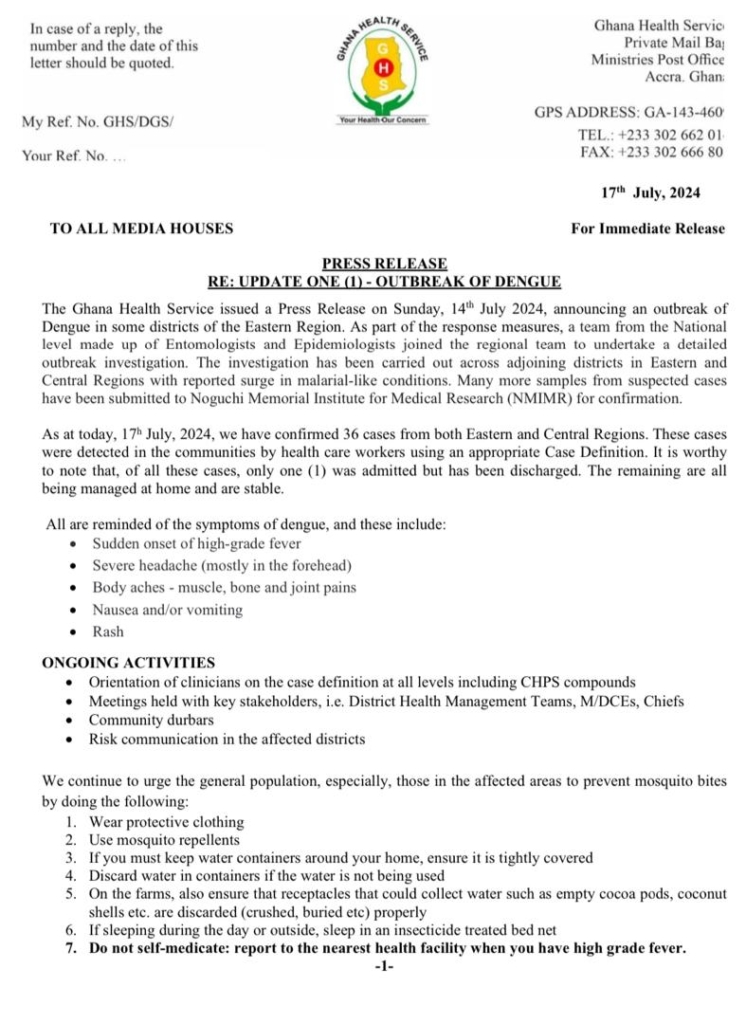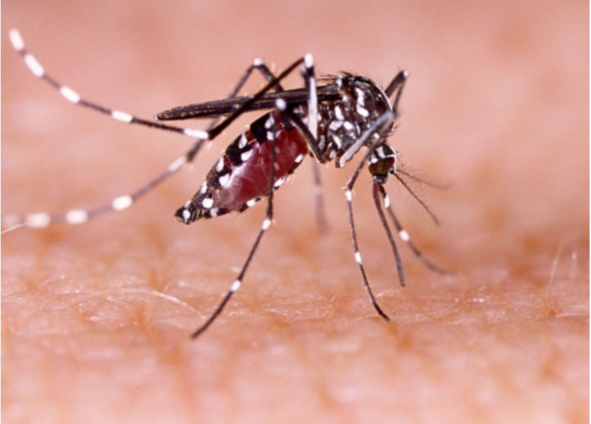
Audio By Carbonatix
The Director of Public Health at the Ghana Health Service (GHS), Dr Franklin Asiedu Bekoe, has emphasised the importance of early detection and treatment in addressing health issues.
In a recent interview, he cautioned the public against self-medicating if they experience fever, as it could be Dengue Fever, and stressed the importance of reporting to a hospital for early treatment.
"The focus is about early detection and that is what we are doing so when you have a fever, don’t assume that it is malaria then you self-medicate. Come to the hospital, we take your blood – we first find out whether it is malaria and examine the cause of the fever,” he said.
This warning follows the Ghana Health Service's statement on July 17, confirming 36 cases of Dengue Fever in the Central and Eastern regions over the past 72 hours.
The statement noted that the cases were identified using an appropriate case definition, with one patient being admitted and subsequently discharged.

Dr Bekoe assured that the recorded cases are recovering well, as most are non-severe Dengue cases.
Dr Bekoe also detailed the Ghana Health Service's latest plans to slow the spread of Dengue Fever, which includes extensive community campaigns through information centers, radio stations, and public announcements to caution people about the Aedes mosquito, which spreads the virus.
Read also: Dengue Fever: Health experts sensitise affected region
Dengue Fever, a severe flu-like illness caused by a virus spread by Aedes mosquitoes, has the potential to spread to other areas if not properly managed.
Overview of Dengue Fever: According to the World Health Organization (WHO), dengue is a viral infection transmitted to humans through the bite of infected mosquitoes.
Approximately half of the world's population is at risk, with an estimated 100–400 million infections occurring annually. Many dengue infections are asymptomatic or cause mild illness, but the virus can occasionally lead to severe cases and even death.
Danger and Prevention: Dengue is particularly dangerous because its prevention and control depend on vector control. There is no specific treatment for dengue or severe dengue. Early detection and proper medical care significantly reduce the fatality rates of severe dengue. Most people infected with dengue will not show symptoms, but common symptoms include high fever, headache, body aches, nausea, and rash.
Recovery typically occurs within 1–2 weeks, but severe cases may require hospitalization and can be fatal. The risk of dengue can be lowered by avoiding mosquito bites, especially during the day.
Symptoms of dengue fever include:
- High fever
- Severe headache
- Pain behind the eyes
- Muscle and joint pains
- Nausea
- Vomiting
- Swollen glands
- Rash
Latest Stories
-
Gov’t to back private sector to establish three garment factories, create 27,000 jobs – Trade Minister
3 minutes -
NSA urges organisations to recognise attestation letters for service personnel
13 minutes -
‘Allegedly’ does not protect against lawsuit—Lawyer
19 minutes -
KMA Mayor orders immediate closure of Kumasi chop bar over severe sanitary breaches
19 minutes -
Global markets on alert as Europe to suspend approval of US trade deal
19 minutes -
Ghana and France launch jungle training to combat illegal mining
30 minutes -
Mumps outbreak hits Keta Township, 50 affected
30 minutes -
Chamber of Mines pledges support for GoldBod’s local refinery, commits large-scale mining backing
40 minutes -
Ghana’s trade, industry outlook promising – Trade Minister
1 hour -
Ibrahim Sulemana set for Cagliari loan spell until end of season
1 hour -
Police arrest suspect in connection with Obuasi robbery and murder
1 hour -
Amasaman High Court adjourns Nana Agradaa appeal, sets February 5 for judgment
1 hour -
NUGS-UK appoints new executives for 2025/2026 academic year
1 hour -
Trade Minister announces 2026 amendment to strengthen Made-in-Ghana products
1 hour -
Obiri Yeboah Samuel appointed President of NUGS UK Chapter
2 hours

